ifndef RATIONALH if this compiler macro is not defined defi
#ifndef RATIONAL_H // if this compiler macro is not defined
#define RATIONAL_H // then define it so this file will not be processed again
#include \"stdafx.h\" // use only for Microsoft Visual Studio C++
#include <iostream>
using namespace std;
class Rational
{
// Friend functions are actually declared outside the scope of the
// class but have the right to access public and private data and
// member function members that belong to the class. The friend
// function below gives the << operator for ostreams (including cout)
// the ability to output a Rational object by accessing its member data.
friend ostream &operator<< (ostream &out, Rational const &r);
public:
Rational(int num = 0, int denom = 1); // also provides default constructor
Rational add(Rational right);
Rational operator+ (Rational right); // + addition operator
Rational operator+= (Rational right); // += addition assignment operator
Rational operator- (Rational right); // + addition operator
Rational operator-= (Rational right); // += addition assignment operator
void display();
operator double() const; // convert Rational to double
private:
int numerator;
int denominator;
// helper functions are private and not accessible by the main program
int LCD(int v1, int v2);
Rational setRational(int n, int d);
};
#endif
#include \"stdafx.h\"
#include <iostream>
#include \"Rational.h\"
using namespace std;
// By using the default parameter settings in Rational.h, this
// constructor also provides the default constructor Rational()
Rational::Rational(int num, int denom)
{
setRational(num, denom); // set numerator and denominator, reduce fraction, fix the sign
}
// Helper function to fix a zero denominator and fix the sign if denominator is negative
Rational Rational::setRational(int n, int d) // helper function
{
numerator = n;
denominator = d;
// if denominator == 0 then set it = 1
if (denominator == 0)
denominator = 1;
if (denominator < 0) // if denominator is neg, multiply num and denom by -1
{
numerator = -numerator; // fix sign of numerator +/-
denominator = -denominator; // denominator always +
}
int lcd = LCD(numerator, denominator);
if (denominator != 0)
{
numerator /= lcd;
denominator /= lcd;
}
return *this; // return the current object
}
// find the lowest common divisor using a recursive function
int Rational::LCD(int v1, int v2)
{
if (v2 == 0) return v1;
else return LCD(v2, v1%v2);
}
Rational Rational::add(Rational right)
{
int newNumerator;
int newDenominator;
newNumerator = numerator*right.denominator + right.numerator*denominator;
newDenominator = denominator * right.denominator;
// create a new Rational object and return it
return setRational(newNumerator, newDenominator);
}
// the operator+ method does the same thing as the add method
Rational Rational::operator+ (Rational right)
{
int newNumerator;
int newDenominator;
newNumerator = numerator*right.denominator + right.numerator*denominator;
newDenominator = denominator * right.denominator;
// create a new Rational object and return it
return setRational(newNumerator, newDenominator);
}
Rational Rational::operator+= (Rational right)
{
numerator = numerator*right.denominator + right.numerator*denominator;
denominator = denominator * right.denominator;
// fix the sign, reduce the fraction and return the current object
return setRational(numerator, denominator);
}
// the operator- method does the same thing as the add method
Rational Rational::operator- (Rational right)
{
int newNumerator;
int newDenominator;
newNumerator = numerator*right.denominator - right.numerator*denominator;
newDenominator = denominator * right.denominator;
// create a new Rational object and return it
return setRational(newNumerator, newDenominator);
}
Rational Rational::operator-= (Rational right)
{
numerator = numerator*right.denominator - right.numerator*denominator;
denominator = denominator * right.denominator;
// fix the sign, reduce the fraction and return the current object
return setRational(numerator, denominator);
}
Rational::operator double() const // convert Rational to double and return
{
return double(numerator) / double(denominator);
}
// Display a Rational number using the display() member method
void Rational::display()
{
cout << numerator << \'/\' << denominator;
}
// Display a Rational number using << and a friend function.
// Friend functions are not part of the class and their code must be
// declared outside of the class with no :: Scope Resolution Operator.
// All function arguments must have their type/class defined
ostream &operator<< (ostream &out, Rational const &r)
{
out << r.numerator << \'/\' << r.denominator;
return out;
}
// Rational.cpp : Defines the entry point for the console application.
// Create a Rational class defination
// Rational(numerator, denominator)
//
#include \"stdafx.h\" // only for Microsoft Visual Studio C++
#include \"Rational.h\" // double quotes = find file in project folder
#include <iostream> // angle brackets = find file in compiler folder
using namespace std;
// function prototypes
void displayNumbers(double, Rational, Rational, Rational, Rational);
void display(Rational);
int main(int argc, char* argv[])
{
// class object
// | |
// V V
double num1 = 1.5; // sample definition of a double number
Rational num2; // call the constructor with no arguments
Rational num3(3, 4); // call the constructor setting num3 to 3/4
Rational num4(2, 3); // call the constructor setting num4 to 2/3
Rational num5; // call the constructor with no arguments
display(num1);
displayNumbers(num1, num2, num3, num4, num5);
cout << \"verify that addition works correctly\" << endl;
// use the add member method (without overloading)
num2 = num3.add(num4); // num3 + num4 = 3/4 + 2/3 = 9/12 + 8/12 = 17/12
cout << \"num2 = num3.add(num4)\" << endl << \"num2,display();\" << endl;
num2.display(); // using the display( ) member function
cout << endl << endl;
// use the operator+ method
num2 = num3.operator+(num4); // num3 + num4 = 3/4 + 2/3 = 9/12 + 8/12 = 17/12
cout << \"num3.operator+(num4)\" << endl;
displayNumbers(num1, num2, num3, num4, num5);
// use the + overloaded operator, use the friend operator << to display the result
num2 = num3 + num4; // num3 + num4 = 3/4 + 2/3 = 9/12 + 8/12 = 17/12
cout << \"num2 = num3 + num4\" << endl;
displayNumbers(num1, num2, num3, num4, num5);
// use the += overloaded operator, use the friend operator << to display the result
num5 = num3 += num4; // num3 + num4 = 3/4 + 2/3 = 9/12 + 8/12 = 17/12
cout << \"num5 = num3 += num4\" << endl;
displayNumbers(num1, num2, num3, num4, num5);
num3 = Rational(3, 4);
cout << \"Reset num3 back to 3/4\" << endl;
displayNumbers(num1, num2, num3, num4, num5);
cout << endl << \"---------------------------------------\" << endl;
cout << \"verify that subtraction works correctly\" << endl;
// use the - overloaded operator, use the friend operator << to display the result
num2 = num3 - num4; // num3 + num4 = 3/4 - 2/3 = 9/12 - 8/12 = 1/12
cout << \"num2 = num3 - num4\" << endl;
displayNumbers(num1, num2, num3, num4, num5);
// use the -= overloaded operator, use the friend operator << to display the result
num5 = num3 -= num4; // num3 - num4 = 3/4 - 2/3 = 9/12 - 8/12 = 1/12
cout << \"num5 = num3 += num4\" << endl;
displayNumbers(num1, num2, num3, num4, num5);
num3 = Rational(3, 4);
cout << \"Reset num3 back to 3/4\" << endl;
displayNumbers(num1, num2, num3, num4, num5);
// convert the Rational number to double
cout << \"double(num2) = \" << double(num2) << endl; // 17/12 = 1.4166
cout << endl;
return 0;
}
void display(Rational num1)
{
cout << \"num1 = \" << num1 << endl;
}
void displayNumbers(double num1, Rational num2, Rational num3,
Rational num4, Rational num5)
{
cout << \"num1\\t num2\\t num3\\t num4\\t num5\ \";
cout << num1 << \"\\t \" << num2 << \"\\t \" << num3 << \"\\t \"
<< num4 << \"\\t \" << num5 << endl << endl;
}
Solution
#ifndef RATIONAL_H
#define RATIONAL_H
#include \"stdafx.h\"
#include <iostream>
using namespace std;
class Rational
{
friend ostream &operator<< (ostream &out, Rational const &r);
public:
Rational(int num = 0, int denom = 1); // also provides default constructor
Rational add(Rational right);
Rational operator+ (Rational right); // + addition operator
Rational operator+= (Rational right); // += addition assignment operator
Rational operator- (Rational right); // + addition operator
Rational operator-= (Rational right); // += addition assignment operator
void display();
operator double() const; // convert Rational to double
private:
int numerator;
int denominator;
// helper functions are private and not accessible by the main program
int LCD(int v1, int v2);
Rational setRational(int n, int d);
};
#endif
#include \"stdafx.h\"
#include <iostream>
#include \"Rational.h\"
using namespace std;
Rational::Rational(int num, int denom)
{
setRational(num, denom);
}
Rational Rational::setRational(int n, int d)
{
numerator = n;
denominator = d;
// if denominator == 0 then set it = 1
if (denominator == 0)
denominator = 1;
if (denominator < 0) // if denominator is neg, multiply num and denom by -1
{
numerator = -numerator; // fix sign of numerator +/-
denominator = -denominator; // denominator always +
}
int lcd = LCD(numerator, denominator);
if (denominator != 0)
{
numerator /= lcd;
denominator /= lcd;
}
return *this; // return the current object
}
// find the lowest common divisor using a recursive function
int Rational::LCD(int v1, int v2)
{
if (v2 == 0) return v1;
else return LCD(v2, v1%v2);
}
Rational Rational::add(Rational right)
{
int newNumerator;
int newDenominator;
newNumerator = numerator*right.denominator + right.numerator*denominator;
newDenominator = denominator * right.denominator;
// create a new Rational object and return it
return setRational(newNumerator, newDenominator);
}
// the operator+ method does the same thing as the add method
Rational Rational::operator+ (Rational right)
{
int newNumerator;
int newDenominator;
newNumerator = numerator*right.denominator + right.numerator*denominator;
newDenominator = denominator * right.denominator;
// create a new Rational object and return it
return setRational(newNumerator, newDenominator);
}
Rational Rational::operator+= (Rational right)
{
numerator = numerator*right.denominator + right.numerator*denominator;
denominator = denominator * right.denominator;
// fix the sign, reduce the fraction and return the current object
return setRational(numerator, denominator);
}
// the operator- method does the same thing as the add method
Rational Rational::operator- (Rational right)
{
int newNumerator;
int newDenominator;
newNumerator = numerator*right.denominator - right.numerator*denominator;
newDenominator = denominator * right.denominator;
// create a new Rational object and return it
return setRational(newNumerator, newDenominator);
}
Rational Rational::operator-= (Rational right)
{
numerator = numerator*right.denominator - right.numerator*denominator;
denominator = denominator * right.denominator;
// fix the sign, reduce the fraction and return the current object
return setRational(numerator, denominator);
}
Rational::operator double() const // convert Rational to double and return
{
return double(numerator) / double(denominator);
}
// Display a Rational number using the display() member method
void Rational::display()
{
cout << numerator << \'/\' << denominator;
}
// Display a Rational number using << and a friend function.
// Friend functions are not part of the class and their code must be
// declared outside of the class with no :: Scope Resolution Operator.
// All function arguments must have their type/class defined
ostream &operator<< (ostream &out, Rational const &r)
{
out << r.numerator << \'/\' << r.denominator;
return out;
}
#include \"stdafx.h\" // only for Microsoft Visual Studio C++
#include \"Rational.h\" // double quotes = find file in project folder
#include <iostream> // angle brackets = find file in compiler folder
using namespace std;
// function prototypes
void displayNumbers(double, Rational, Rational, Rational, Rational);
void display(Rational);
int main(int argc, char* argv[])
{
// class object
// | |
// V V
double num1 = 1.5; // sample definition of a double number
Rational num2; // call the constructor with no arguments
Rational num3(3, 4); // call the constructor setting num3 to 3/4
Rational num4(2, 3); // call the constructor setting num4 to 2/3
Rational num5; // call the constructor with no arguments
display(num1);
displayNumbers(num1, num2, num3, num4, num5);
cout << \"verify that addition works correctly\" << endl;
// use the add member method (without overloading)
num2 = num3.add(num4); // num3 + num4 = 3/4 + 2/3 = 9/12 + 8/12 = 17/12
cout << \"num2 = num3.add(num4)\" << endl << \"num2,display();\" << endl;
num2.display(); // using the display( ) member function
cout << endl << endl;
// use the operator+ method
num2 = num3.operator+(num4); // num3 + num4 = 3/4 + 2/3 = 9/12 + 8/12 = 17/12
cout << \"num3.operator+(num4)\" << endl;
displayNumbers(num1, num2, num3, num4, num5);
// use the + overloaded operator, use the friend operator << to display the result
num2 = num3 + num4; // num3 + num4 = 3/4 + 2/3 = 9/12 + 8/12 = 17/12
cout << \"num2 = num3 + num4\" << endl;
displayNumbers(num1, num2, num3, num4, num5);
// use the += overloaded operator, use the friend operator << to display the result
num5 = num3 += num4; // num3 + num4 = 3/4 + 2/3 = 9/12 + 8/12 = 17/12
cout << \"num5 = num3 += num4\" << endl;
displayNumbers(num1, num2, num3, num4, num5);
num3 = Rational(3, 4);
cout << \"Reset num3 back to 3/4\" << endl;
displayNumbers(num1, num2, num3, num4, num5);
cout << endl << \"---------------------------------------\" << endl;
cout << \"verify that subtraction works correctly\" << endl;
// use the - overloaded operator, use the friend operator << to display the result
num2 = num3 - num4; // num3 + num4 = 3/4 - 2/3 = 9/12 - 8/12 = 1/12
cout << \"num2 = num3 - num4\" << endl;
displayNumbers(num1, num2, num3, num4, num5);
// use the -= overloaded operator, use the friend operator << to display the result
num5 = num3 -= num4; // num3 - num4 = 3/4 - 2/3 = 9/12 - 8/12 = 1/12
cout << \"num5 = num3 += num4\" << endl;
displayNumbers(num1, num2, num3, num4, num5);
num3 = Rational(3, 4);
cout << \"Reset num3 back to 3/4\" << endl;
displayNumbers(num1, num2, num3, num4, num5);
// convert the Rational number to double
cout << \"double(num2) = \" << double(num2) << endl; // 17/12 = 1.4166
cout << endl;
return 0;
}
void display(Rational num1)
{
cout << \"num1 = \" << num1 << endl;
}
void displayNumbers(double num1, Rational num2, Rational num3,
Rational num4, Rational num5)
{
cout << \"num1\\t num2\\t num3\\t num4\\t num5\ \";
cout << num1 << \"\\t \" << num2 << \"\\t \" << num3 << \"\\t \"
<< num4 << \"\\t \" << num5 << endl << endl;
}
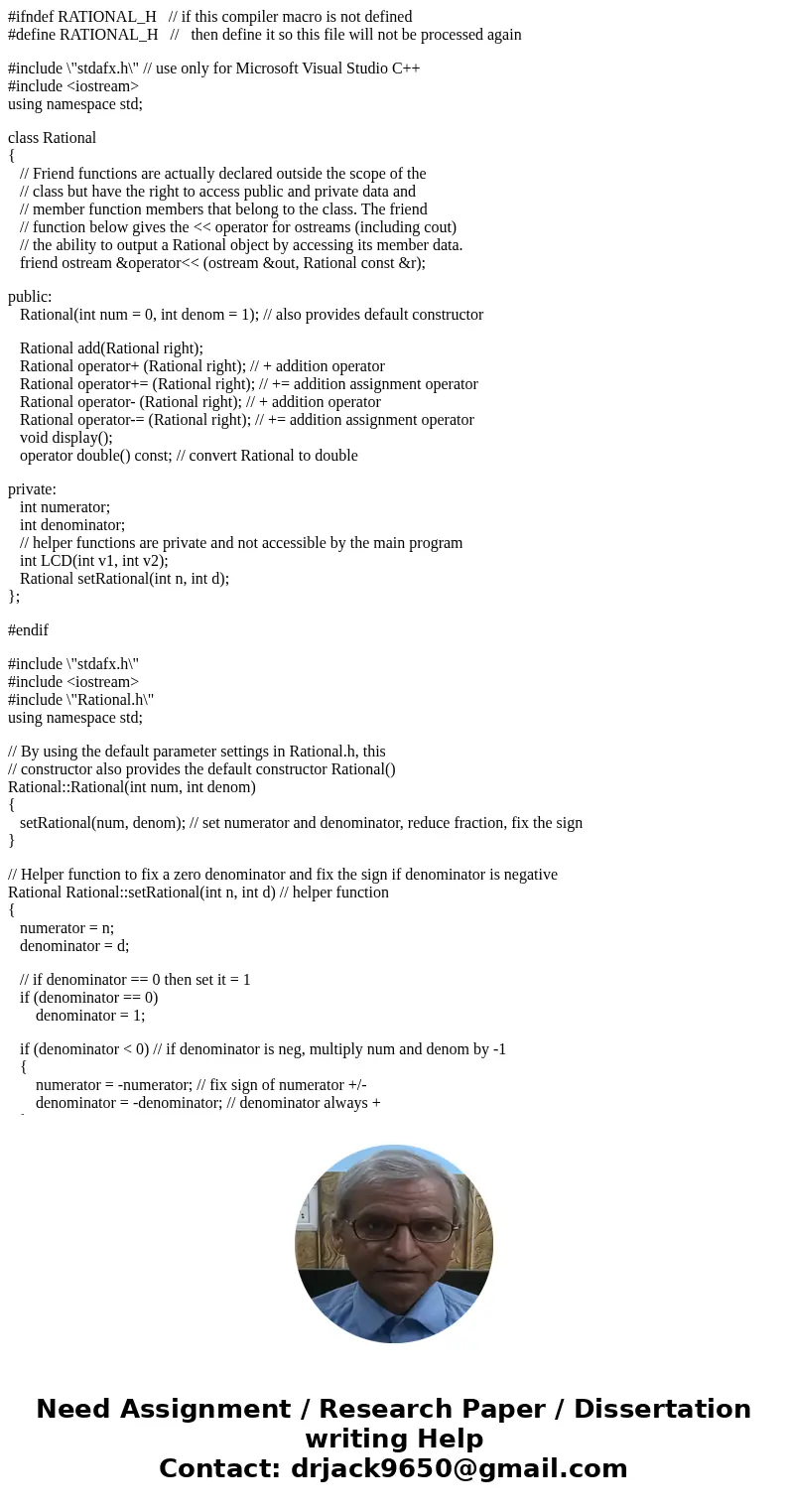
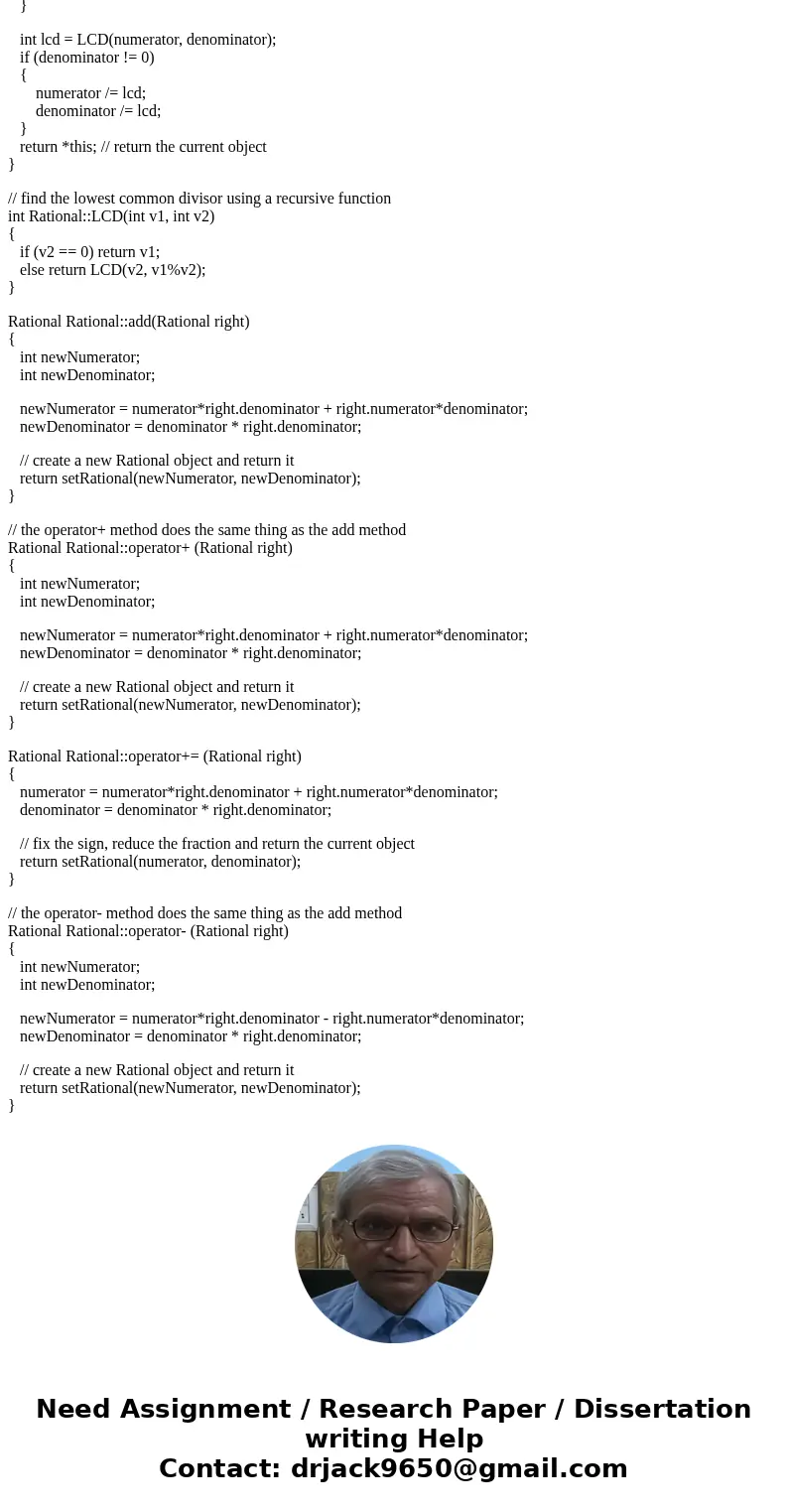
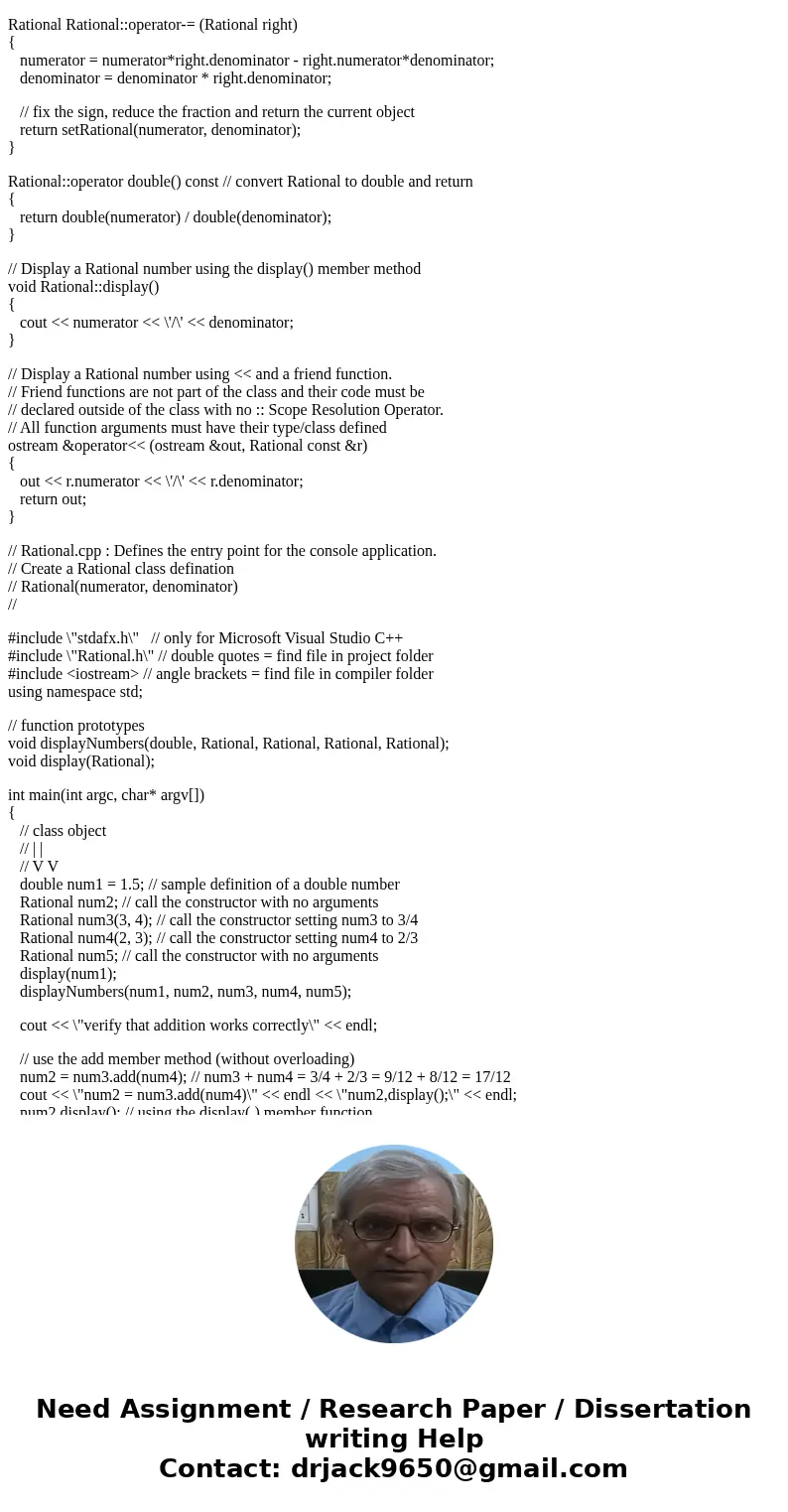
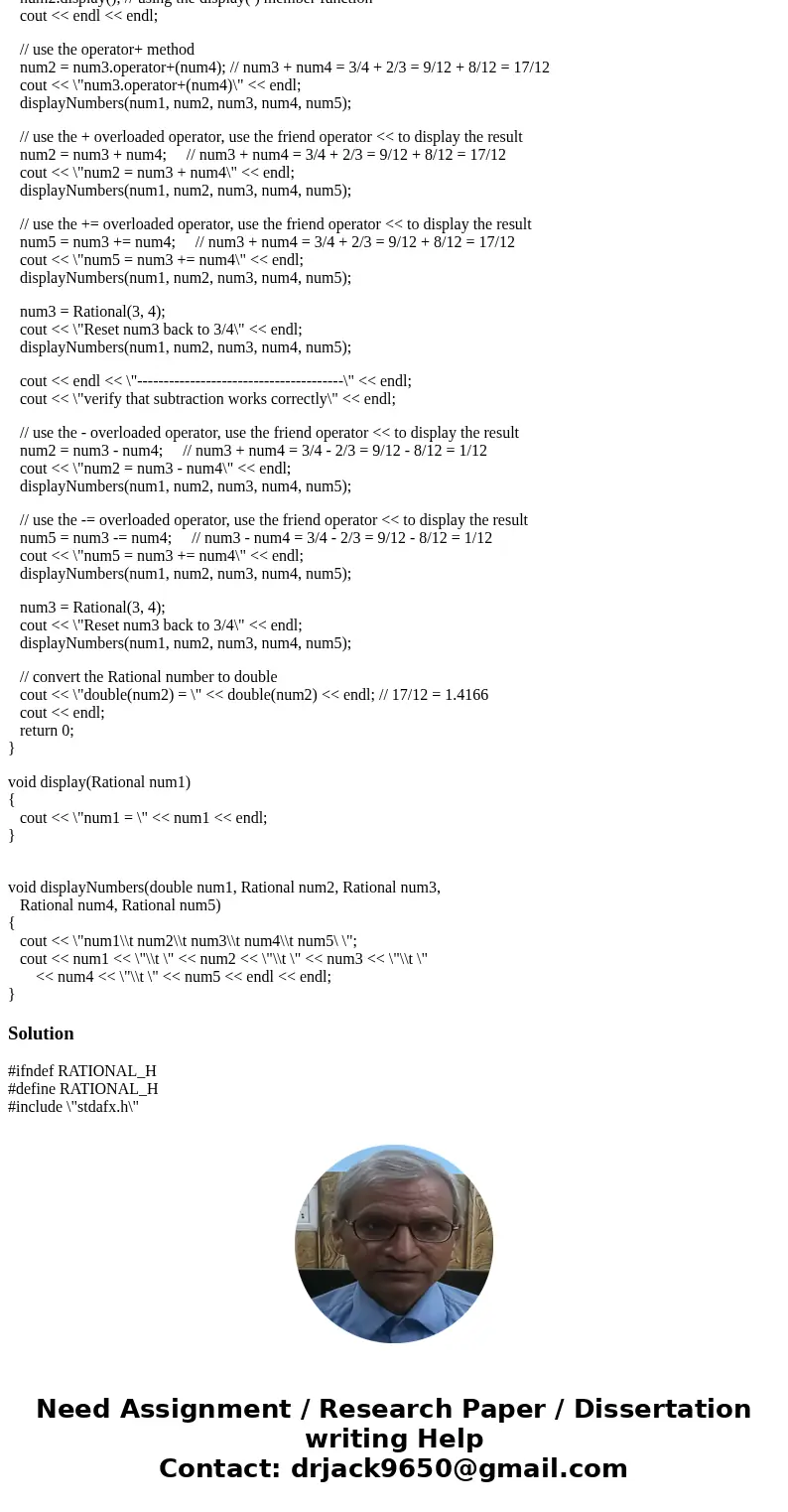
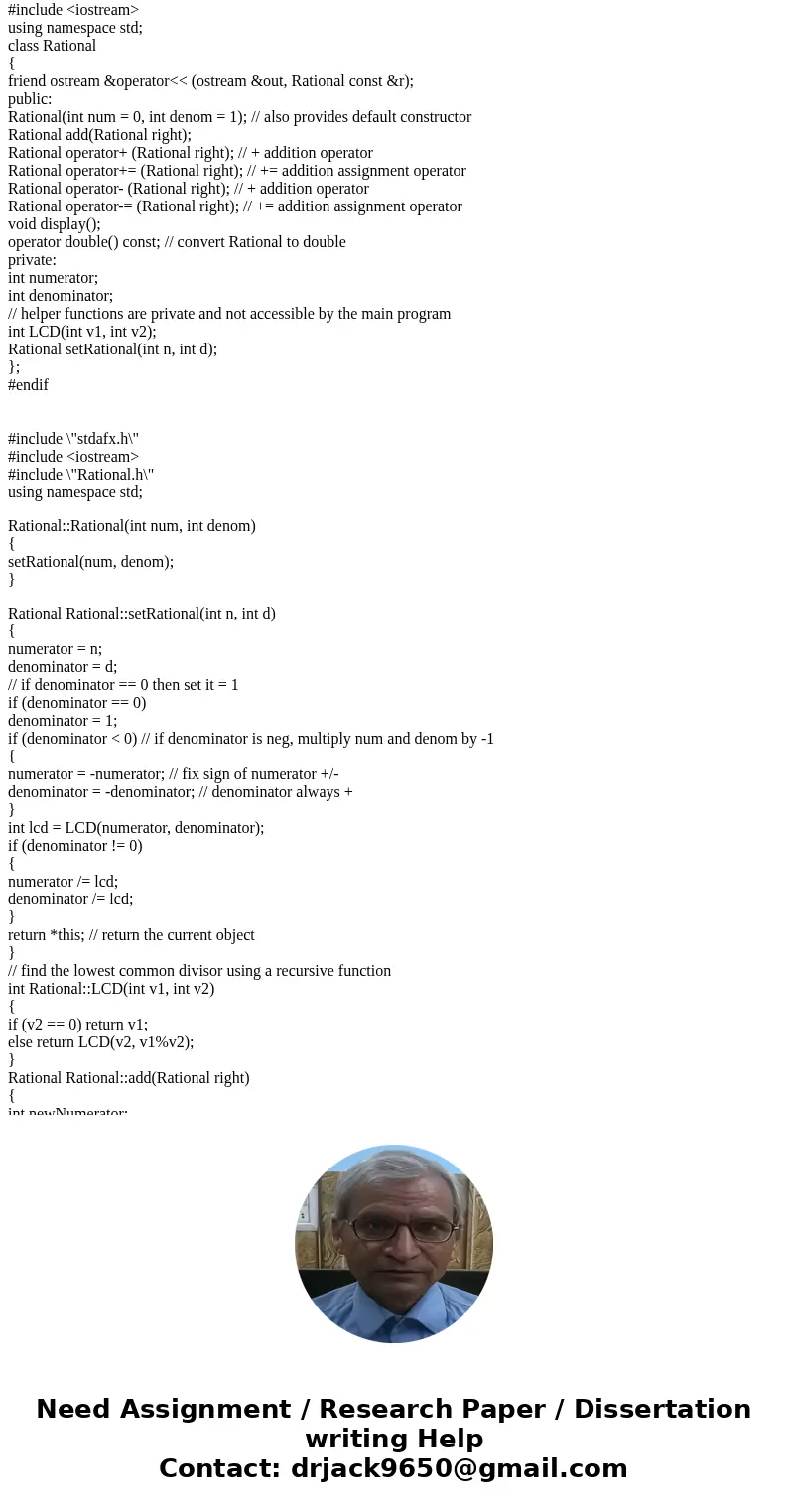
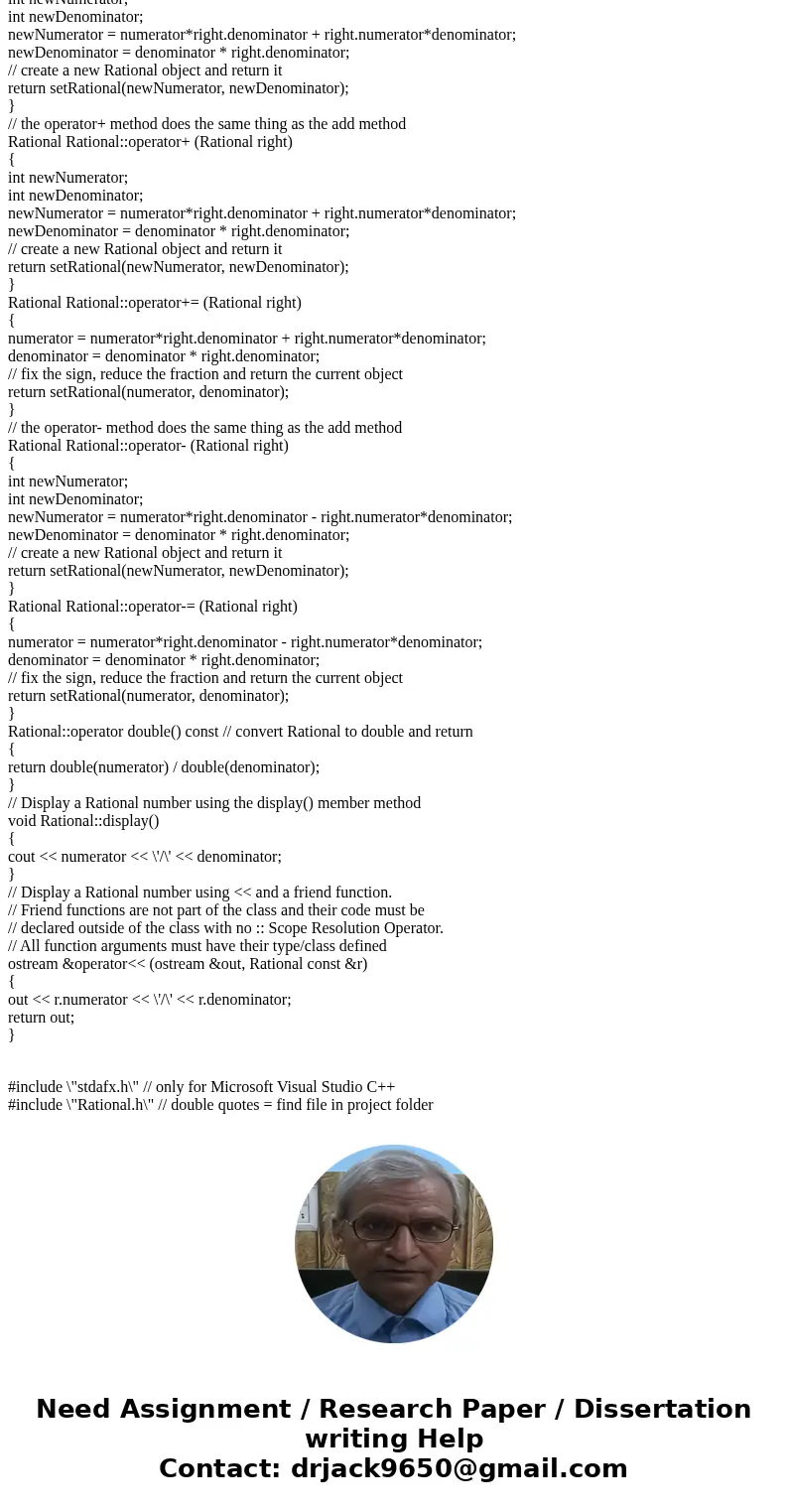
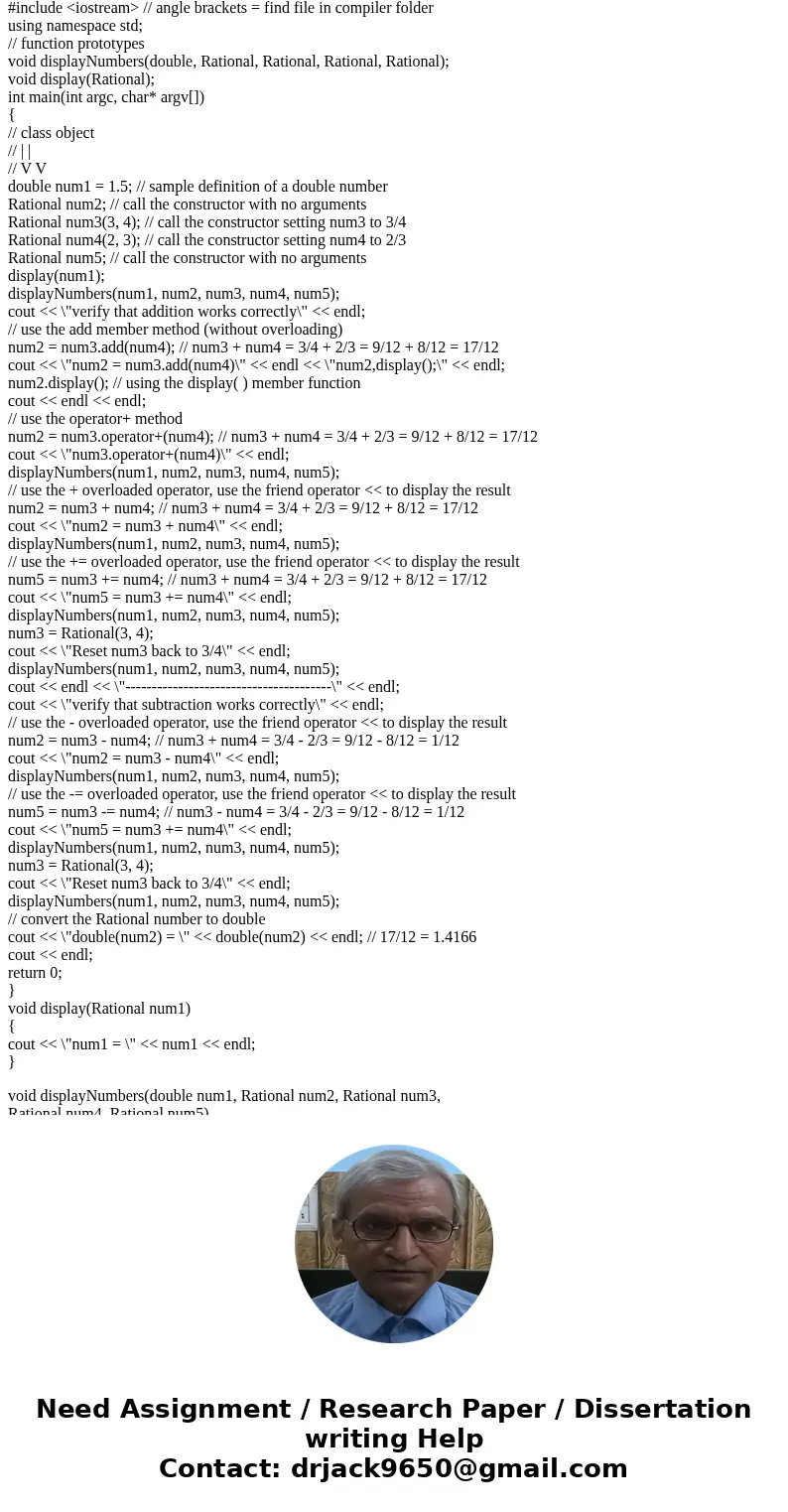
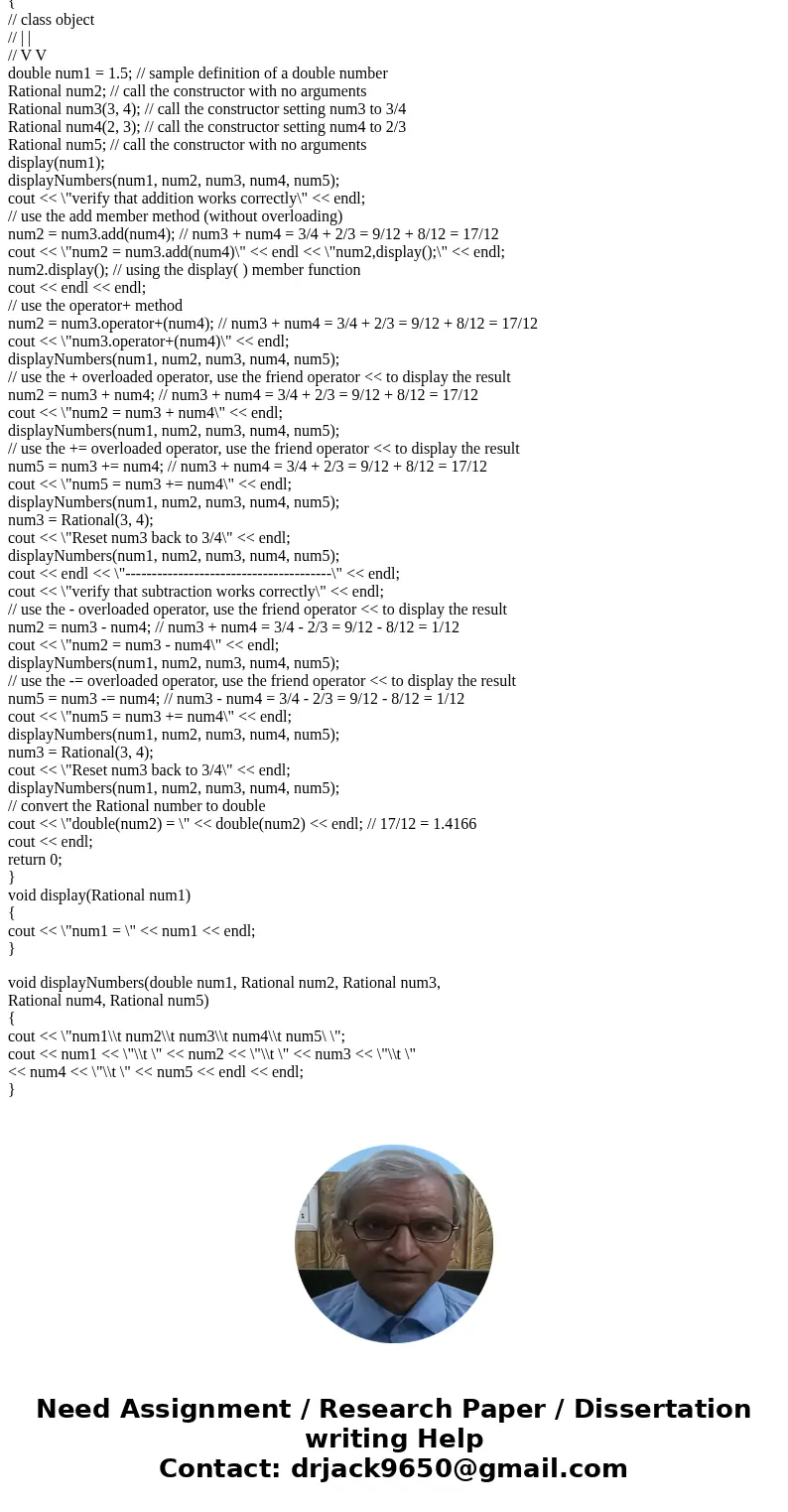
 Homework Sourse
Homework Sourse